8+ Sample Remote Work Proposal
-
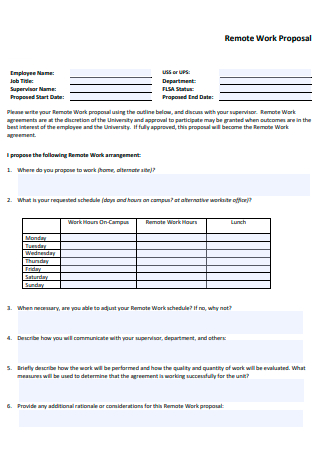
Remote Work Proposal Template
download now -
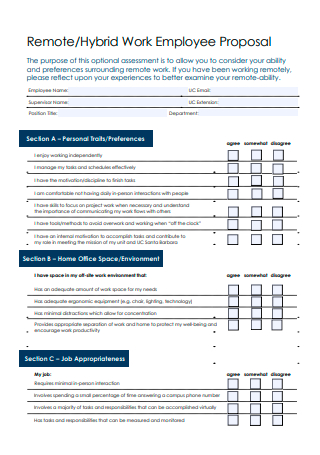
Remote Hybrid Work Employee Proposal
download now -
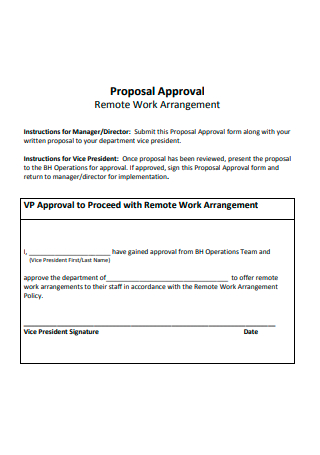
Remote Work Arrangement Proposal Approval
download now -
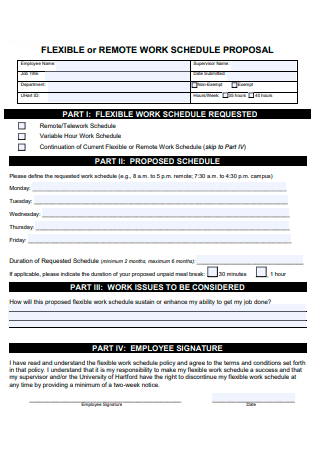
Remote Work Schedule Proposal
download now -
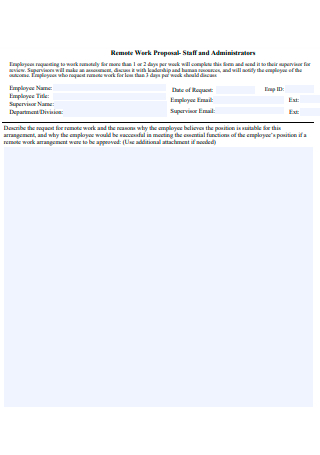
Basic Remote Work Proposal
download now -
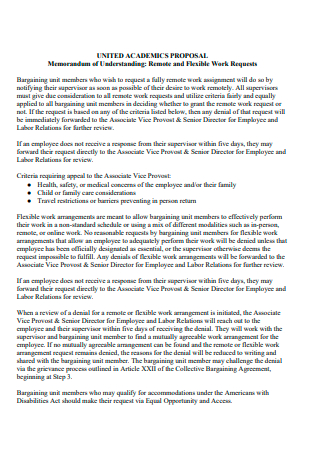
Remote and Flexible Work Request Academic Proposal
download now -
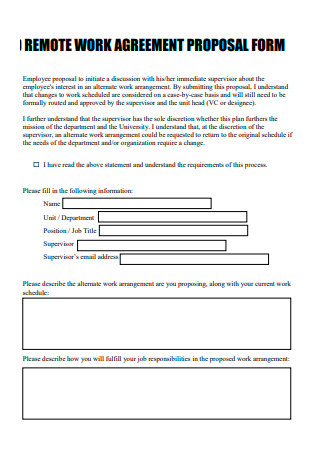
Remote Work Agreement Proposal Form
download now -
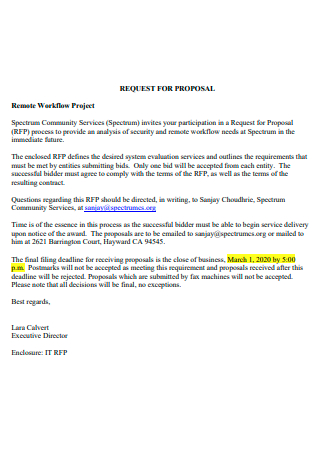
Remote Work Flow Project Proposal
download now -
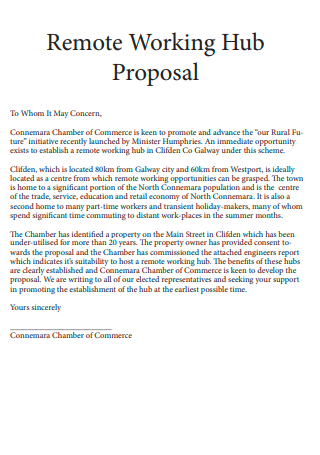
Remote Working Hub Proposal
download now
FREE Remote Work Proposal s to Download
8+ Sample Remote Work Proposal
What Is a Remote Work Proposal?
Advantages of Remote Work
Requirements for a Remote Work
Steps on How to Write a Remote Work Proposal
FAQS
Why Is It Important to Make a Remote Work Proposal?
Are There Many Remote Work Jobs?
Is Remote Work Better?
What Is a Remote Work Proposal?
A remote work proposal is a written document or, more accurately, a request to work remotely in a virtual environment. An individual is still provided with the same tools and accessories to execute their job and is monitored in a virtual domain. Their only distinction is their geographical location. Working remotely means working away from the corporate office’s current location. Typically, in the privacy of one’s own house. A signed remote work agreement by an employee indicates that they agree and have been permitted to work remotely.
Supervisors typically oversee applications to work remotely. That is for work quality assurance. As well as ensuring that personnel are efficient enough to work remotely. An employee can pitch the idea of working remotely to their leaders or supervisors. It could be because of their location or their physical condition. Both sides may be able to reach an agreement if you clarify your reasoning in the proposal. However, working remotely does not preclude in-person meetings. There are undoubtedly numerous advantages to working from home.
Advantages of Remote Work
A proposal to work remotely must first consider its benefits and drawbacks. The issues under consideration should be given equal weight by both the corporation and the employees. To pull off successfully throughout its operation, it should consider the variables that can have significance in it. That is, its merits should outweigh its disadvantages. And we can see what to look out for in the list below.
Requirements for a Remote Work
A proposal for remote work from home is not always certain to be approved. There are also a number of difficulties that must be addressed. There are a few exceptions, such as during a pandemic. It becomes a strategic work plan method. Most notably, the challenges surrounding employee training, which would be significantly more difficult in a remote context. Aside from the aforementioned reason, let’s look at the other prerequisites for remote employment.
Steps on How to Write a Remote Work Proposal
Writing a remote job proposal might be time-consuming. Especially if it is a fresh idea that has been proposed to management. Or if it necessitates a significant amount of technological ingenuity. Nonetheless, in the midst of a pandemic, remote work provides genuine opportunities. Chances that would otherwise be difficult to obtain. Remote work also reduces a person’s anxiety about their health. So, here’s how to create an appealing remote work proposal.
-
1. Create a Work Plan
It is critical to provide a work plan in the proposal. The work plan influences the pace of deliverables as well as the goals of each job position. A work plan assists an employee in navigating their work lifestyle in a remote location. A work plan, in addition to supervisors or team leaders, serves as a guide. Your proposal specifies the processes and goals for the employee upon implementation by generating a work plan.
-
2. Create Job Transition Steps
There will be some changes required if the remote job is not directly at the outset. Each employee’s role had to be transitioned as a result of this. The changes will be made. And, in order for it to be successful, everyone must work together properly. This necessitates steps that they can take. It doesn’t have to be extremely difficult. It must, however, be detailed. This is done to facilitate comprehension and understanding. It also reduces the number of queries that will be raised and the amount of time that work will be delayed.
-
3. List Down the Benefits
Listing the benefits helps the cause as an appeal to management. It makes it easier to persuade people why it should be implemented. Importantly, demonstrating the benefits identifies the potential source of the problem. The disadvantage of remote labor, on the other hand, cannot be ignored. It can, however, be reduced. One of the most significant advantages of remote work is the elimination of the need to pay for corporate office space as well as the expenses that can accumulate alongside the rent. It also reduces the risks that exist in the building. Most importantly, because expenses are reduced, the company’s profit improves. In some circumstances, it may even boost productivity. Some people thrive and relish away from the office’s watchful and oppressive confines.
-
4. List Down the Strategies
There are numerous tactics involved in the process of remote work. It includes contingency plans, transition strategies, and the key approach to the process. Simultaneously, the plans must limit the company’s loss. It should help to redirect future crises, such as a drop in productivity. Or maybe it’s employee turnover. As well as technological obstacles. Making plans ahead of time reduces the likelihood of delays and financial loss for the day.
-
5. Ideal Setup
Unlike in a corporate setting where a set-up is already in place, remote may necessitate the establishment of one. There should be an ideal arrangement that everyone is encouraged to have. This is due to the fact that applications and software that are required may put strain on computers if they lack the necessary parts. It also slows down the progress of everyone involved.
-
6. List Down Required Tools
Remote work necessitates the use of tools, both software and hardware. Whether they are provided by the company or the employee. Tools such as equipment or the internet should be expressly mentioned in the proposal. Collaborative tools that track everyone’s progress or daily work are also essential.
FAQS
Why Is It Important to Make a Remote Work Proposal?
A remote work proposal helps to mitigate any potential problems associated with remote work. Because it is subject to approval, a proposal could expedite the process. Especially when you present the benefits as well as the specifics of how it works. The plan could make a stronger case for why it is possible and likely to succeed. Since not every career job is suitable for remote work. The proposal outlines the elements, benefits, and contribution to the company.
Are There Many Remote Work Jobs?
Any desk job that merely requires computers and an internet connection is more likely to be accommodating to remote work. And, in this day and age, technological progress only serves to further the cause. Software engineers, web developers, content writers, and graphic designers are just a few examples. You don’t have to go to crowded cities to do your ideal career if you have the necessary qualifications.
Is Remote Work Better?
Remote employees have more free time. Their productivity may also increase due to the convenience of their selected location. They also don’t have to deal with the hustle and bustle of commuting and traveling to work. However, remote work can only be successful if both the company and the employee put in the effort. Their performance would be the most important.
During the pandemic, many employers allowed their staff to work from home. The performance of its personnel determines whether it is better or worse. However, it also provided additional chances to people living in isolated locations. That is why, after reviewing the samples above, you should begin constructing your own remote job proposal template!
